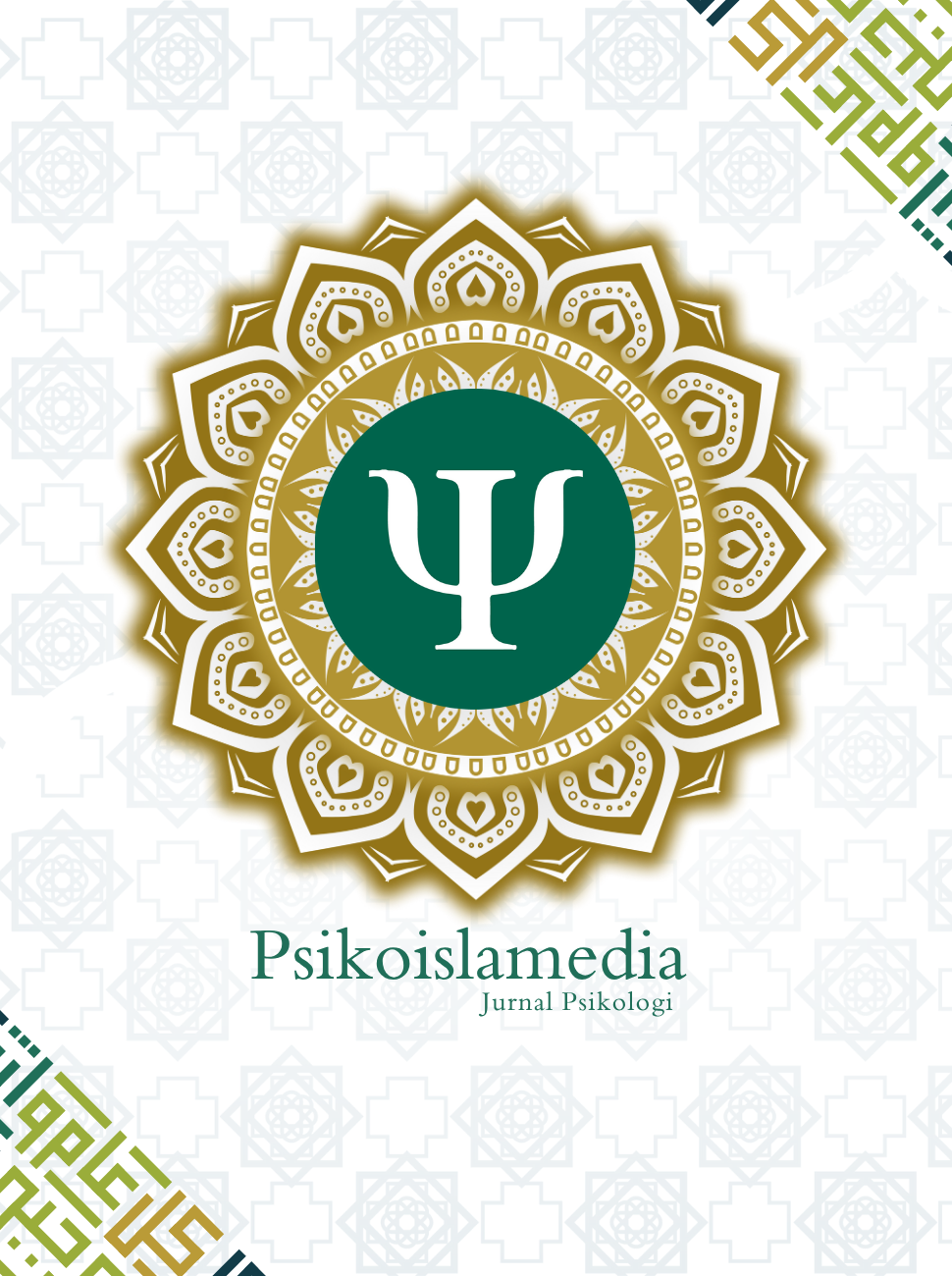SISI NEGATIF GAME ONLINE PERSPEKTIF ISLAM DAN PSIKOLOGI ISLAM
DOI:
https://doi.org/10.22373/psikoislamedia.v5i2.7071Keywords:
Online game, Islam, Islamic psychologyAbstract
Technological development has changed human life style. Child's world that was once filled with traditional games has now been eroded by technological advances. Nowadays online games that replace traditional games are not only favored by children, almost all levels of human age like playing online games. But behind it all there is a negative impact that haunts its users. This study aims to reveal the negative side of using online games from the point of view of Islam and Islamic Psychology. The technique used is literature review by compiling some previous articles. The results showed that excessive use of online games will give a bad impact on the physical and psychological users, such as visual impairment, sleep disturbance, addiction, violence and stress. The use of online games is also considered more disadvantage than the benefits and it’s seen as an activity that wastes time, and it is prohibited in Islam.
References
Adlis, A. (2014). Pengaruh Penggunaan Game Online Terhadap Perilaku Mahasiswa Universitas Islam Riau Pekanbaru. Jom FISIP, 1(2), 1–12.
Argestya, U. (2013). Fenomena Kekerasan Dalam Game Online (Studi Etnometodologi Game Online Terhadap Perilaku Kekerasan Pelajar Usia 6-16 Tahun Di Kecamatan Baki Kabupaten Sukoharjo). SOSIALITAS; Jurnal Ilmiah Pend. Sos Ant, 3(1).
Dinata, O. (2019). Hubungan Kecanduan Game Online Clash of Clans Terhadap Perilaku Sosial (Studi Kasus Game Online Clash of Clans Pada Mahasiswa Sosiologi Fakultas Ilmu Sosial Dan Politik Universitas Riau). Journal of Chemical Information and Modeling, 53(9), 1689–1699. https://doi.org/10.1017/CBO9781107415324.004
Drajat Edy Kurniawan. (2017). Pengaruh Intensitas Bermain Game Online Terhadap Perilaku Prokrastinasi Akademik Pada Mahasiswa Bimbingan Dan Konseling Universitas PGRI Yogyakarta. Jurnal Koseling Gusjigang, 3(1), 1–8. https://doi.org/10.24176/jkg.v3i1.1120
Edrizal. (2018). Pengaruh Kecanduan Siswa Terhadap Game Online (Studi Tentang Kebiasaan Siswa Bermain Game Online) Di Smp N 3 Teluk Kuantan. JURNAL PAJAR (Pendidikan Dan Pengajaran), 2(6), 1001. https://doi.org/10.33578/pjr.v2i6.6543
Febriandari, D., Nauli, F. A., & Rahmalia, S. (2016). Hubungan Kecanduan Bermain Game Online terhadap Identitas Diri Remaja. Jurnal Keperawatan Jiwa Universitas Riau, 4(1), 10.
Firdaus, J. (2018). Pelaksanaan kewajiban orang tua terhadap anak pecandu game online di jalan raya kota bengkulu dalam perspektif hukum islam. QIYAS: Jurnal Hukum Islam Dan Peradilan, 3(1), 206–219. https://doi.org/10.29300/qys.v3i2.1311
Giri, K. G. B., & Dharmadi, M. (2013). Gambaran ketajaman penglihatan berdasarkan intensitas bermain game siswa laki-laki sekolah menengah pertama di wilayah kerja puskesmas Gianyar I. E-Jurnal Medika Udayana, 2013(April), 1–7. https://ojs.unud.ac.id/index.php
Gunawan, D. (2018). Penerapan Konseling Behavioral Teknik Modelling Untuk Mengatasi Kecanduan Game Online Pada Anak Usia 10 Tahun. KONSELI: Jurnal Bimbingan Dan Konseling (E-Journal), 5(2), 105. https://doi.org/10.24042/kons.v5i2.3307
Hadini. (2013). Psikologi subjek didik dalam pandangan ibnu sina. Jurnal.Ar-Raniry, 3, 264–281. https://doi.org/10.22373/jm.v3i2.192
Haeril. (2019). Indeks Massa Tubuh Anak Yang Aktif Bermain Game Online dan Anak Yang Tidak Aktif Bermain Game Online. Jendela Olahraga, 4(2), 44. https://doi.org/10.26877/jo.v4i2.3869
Hafizallah, Y. (2019). Psikologi Islam: Sejarah, Tokoh, Dan Masa Depan. Psychosophia: Journal of Psychology, Religion, and Humanity, 1(1), 1–19. https://doi.org/10.32923/psc.v1i1.860
Hardiyansyah Masya, D. A. C. (2016). Faktor-Faktor Yang Mempengaruhi Perilaku Gangguan Kecanduan Game Online Pada Peserta Didik Kelas X Di Madrasah Aliyah Al Furqon Prabumulih. KONSELI: Jurnal Bimbingan Dan Konseling (E-Journal), 03(1), 17.
Hasan, N. (2019). Elemen-Elemen Psikologi Islami Dalam Pembentukan Akhlak. Spiritualita, 3(1), 105–123. https://doi.org/10.30762/spr.v3i1.1516
Iswan dan Ati Kusmawati. (2015). Pengaruh Online Game Terhadap the Impact of Online Game on Children ’ S Language Development. Jurnal Teknodik, 19(April), 12–23.
Kapoh, G. F. (2015). Perilaku Sosial Individu Pemain Game Online “Perfect World” Di Desa Sea Satu. HOLISTIK, Journal Of Social and Culture., 3(2), 54–67. http://repositorio.unan.edu.ni/2986/1/5624.pdf
La Hadisi. (2015). Pendidikan Karakter Pada Anak Usia Dini La Hadisi. Jurnal Al-Ta’did, 8(2), 50–69.
Ma’u, D. H. (2016). Judi Sebagai Gejala Sosial (Perspektif Hukum Islam). Jurnal Ilmiah Al-Syir’ah, 5(2). https://doi.org/10.30984/as.v5i2.230
Manuputty, J. C., Sekeon, S. A. S., Kandou, G. D., Kesehatan, F., Universitas, M., & Ratulangi, S. (2019). Hubungan Antara Kecanduan Bermain Game Online Dengan Kualitas Tidur Pada Gamer Online Pengguna Komputer Di Warung Internet M2g Supernova Malalayang. Jurnal KESMAS, 8(7), 61–66.
Marlina, Ni Putu, N. M. A. M., & Utami, K. C. (2014). Hubungan Bermain Game Online Dengan Prestasi Belajar Matematika Anak Usia Sekolah Kelas V Di Sekolah Dasar Saraswati I Denpasar Tahun 2014. Coping: Community of Publishing in Nursing.
Pitakasari, A. A., Kandar, & Pambudi, A. (2017). Hubungan Paparan Game Online Berunsur Kekerasan Terhadap Relationship of Online Game Exposure To Violence Towards Agressive Behavior in Adolescents. Jurnal Keperawatan, 96–102.
Piyeke, P., Bidjuni, H., & Wowiling, F. (2014). Hubungan Tingkat Stres Dengan Durasi Waktu Bermain Game Online Pada Remaja Di Manado. Jurnal Keperawatan UNSRAT, 2(2), 105771.
Rahayu, I. T. (2004). Islamisasi Psikologi. Psikoislamika : Jurnal Psikologi Dan Psikologi Islam, 1(1). https://doi.org/10.18860/psi.v0i0.356
Retnaningrum, W. (2018). Pendidikan Karakter Bagi Anak Usia Dini Perspektif Islam. Jurnal Keluarga, 2(2), 56–68. http://ejournal.iaiig.ac.id/index.php/warna/article/view/90
Sagara, S., & Masykur, A. M. (2018). Gambaran Online Gamer. Jurnal Empati, 7(2), 418–424.
Setiawan, A. (2014). Prinsip Pendidikan Karakter Dalam Islam. Jurnal Dinamika Ilmu, 14(1), 47–64. https://doi.org/10.1101/112268
Setiawati, L., Yakub, E., Umari, T., Studi, P., Dan, B., Keguruan, F., Ilmu, D., & Riau, U. (2018). Student of the Online Game Addiction and Conditions of Psychological in Sma Tri Bhakti. Jom Fkip, 5, 1–15.
Suryadarma, Y., & Haq, A. H. (2015). Pendidikan Akhlak Menurut Imam Al-Ghazali. Jurnal At-Ta’dib, 10(2), 362–381.
Suryadi, M. D. (2018). Hubungan Kecanduan Game Online Dengan Hasil Belajar Siswa. Jurnal Wahana Konseling, 1(2), 65–73.
Susanti, M. M., Widodo, W. U., & Safitri, D. I. (2018). Hubungan Kecanduan Bermain Game Online Pada Smartphone (Mobile Online Games) Dengan Pola Makan Anak Sekolah Dasar Kelas 5 Dan 6 Di Sd Negeri 4 Purwodadi. The Shine Cahaya Dunia Ners, 3(2). https://doi.org/10.35720/tscners.v3i2.122
Syahran, R. (2015). Ketergantungan Online Game Dan Penanganannya. Jurnal Psikologi Pendidikan Dan Konseling: Jurnal Kajian Psikologi Pendidikan Dan Bimbingan Konseling, 1(1), 84. https://doi.org/10.26858/jpkk.v1i1.1537
Wiguna, R. I., Menap, H., Ayu, D., Lalu, A., & Asmawariza, H. (2020). Hubungan Kecanduan Bermain Game Online Dengan Motivasi Belajar Pada Anak Usia 10-12 Tahun. Jurnal Surya Muda, 2(1).
Yudiani, E. (2013). Pengantar Psikologi Islam. Jurnal Ilmu Agama UIN Raden Fatah, 14(2), 175–186.
Yuliastutik, I. (2016). Pendapat Ulama MUI Kota Malang Terhadap Jual Beli Account Clash Of Clans (COC). Jurisdictie, 7(1), 90. https://doi.org/10.18860/j.v7i1.3681
Downloads
Published
Issue
Section
License
Authors who publish in this Journal agree to the following terms:
- Authors retain copyright and grant the journal right of first publication with the work simultaneously licensed under Attribution-ShareAlike 4.0 International (CC BY-SA 4.0) allows others to share the work with an acknowledgment of the work's authorship and initial publication in this journal.
- Authors are able to enter into separate, additional contractual arrangements for the non-exclusive distribution of the journal's published version of the work (e.g., post it to an institutional repository or publish it in a book), with an acknowledgment of its initial publication in this journal.
- Authors are permitted and encouraged to post their work online (e.g., in institutional repositories or on their website) prior to and during the submission process, as it can lead to productive exchanges, as well as earlier and greater citation of published work. (See The Effect of Open Acces)














